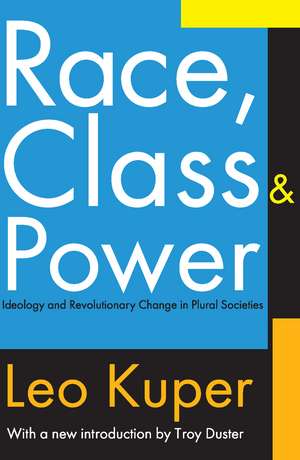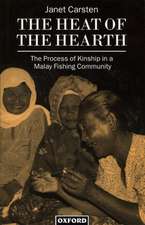Race, Class, and Power: Ideology and Revolutionary Change in Plural Societies
Autor Leo Kuperen Limba Engleză Paperback – 31 aug 2005
| Toate formatele și edițiile | Preț | Express |
|---|---|---|
| Paperback (1) | 421.02 lei 6-8 săpt. | |
| Taylor & Francis – 31 aug 2005 | 421.02 lei 6-8 săpt. | |
| Hardback (1) | 1000.27 lei 6-8 săpt. | |
| Taylor & Francis – 22 noi 2017 | 1000.27 lei 6-8 săpt. |
Preț: 421.02 lei
Nou
Puncte Express: 632
Preț estimativ în valută:
80.57€ • 83.48$ • 67.24£
80.57€ • 83.48$ • 67.24£
Carte tipărită la comandă
Livrare economică 22 martie-05 aprilie
Preluare comenzi: 021 569.72.76
Specificații
ISBN-13: 9780202308005
ISBN-10: 0202308006
Pagini: 348
Dimensiuni: 152 x 229 x 23 mm
Greutate: 0.57 kg
Ediția:1
Editura: Taylor & Francis
Colecția Routledge
Locul publicării:Oxford, United Kingdom
ISBN-10: 0202308006
Pagini: 348
Dimensiuni: 152 x 229 x 23 mm
Greutate: 0.57 kg
Ediția:1
Editura: Taylor & Francis
Colecția Routledge
Locul publicării:Oxford, United Kingdom
Cuprins
AldineTransaction Introduction, Preface, PART ONE: IDEOLOGIES, 1. Ideologies of Cultural Difference in Race Relations, 2. Race Structure in the Social Consciousness, 3. Ideologies of Violence among Subordinate Groups, 4. On the Theme 'Black is Beautiful', PART TWO: REVOLUTIONARY CHANGE, 5. Continuities and Discontinuities in Race Relations: Evolutionary or Revolutionary Change, 6. Political Change in White Settler Societies: The Possibility of Peaceful Democratization, 7. Theories of Revolution and Race Relations, 8. Race, Class and Power: Some Comments on Revolutionary Change, 9. Political Change in Plural Societies: Problems in Racial Pluralism, CONCLUSION, 10. A Personal Statement on Revolutionary Change in Race Relations, APPENDIX I - Review of Class and Colour in South Africa - 1850-1950, APPENDIX II - A Matter of Surrogate Censorship, Bibliography, Index
Descriere
Examining in detail the apparently inexorable polarization of society in such countries as Rwanda, Algeria, and South Africa, the author questions whether current theories correctly explain the past or offer adequate guides for the future

















